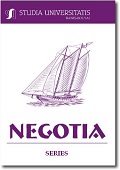TOWARDS A COMPETENCY FRAMEWORK FOR SMES - A SOUTH AFRICAN CASE STUDY
TOWARDS A COMPETENCY FRAMEWORK FOR SMES - A SOUTH AFRICAN CASE STUDY
Author(s): Danie Schutte, Bianca LovechioSubject(s): Economy
Published by: Studia Universitatis Babes-Bolyai
Keywords: Competency Framework; Accounting Education.
Summary/Abstract: Globalization has brought major changes in the world economy, for example a significant increase in trade and investments, rapid technological changes in communications as well as an increasing trend towards deregulation of financial markets. Prospects of increased sales in the world-wide market did not necessarily pose the same benefits to all market participants. In contrast to large multi-national companies, the traditional focus of Small and Medium Enterprises (SMEs) did not include exporting and importing along with alliances, branches and joint ventures abroad. Despite the pivotal roles of small and medium businesses in many economies, the specific challenges resulting from the globalisation phenomenon cannot be denied. Small and medium businesses are faced with challenges such as limited resources and funding, a lack of formal mechanisms and practices, a shortage of trained and experienced staff as well as different classifications of small and medium businesses worldwide. In particular, smaller businesses do not normally have a well-established and functional accounting department. In view of the apparent differences between the accounting function for larger and smaller businesses, the question is asked whether accountants in the small and medium business sector should demonstrate specific skills and competencies to address the distinctive challenges of this sector. The focus of the study is therefore on the recently announced IES2 Initial Professional Development – Technical Competence and its relevance in the South African environment.
Journal: Studia Universitatis Babes Bolyai - Negotia
- Issue Year: 59/2014
- Issue No: 1
- Page Range: 5-20
- Page Count: 16
- Language: English

